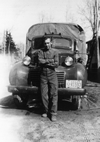11. The Ultimatum
SERAFINO SPENT the rest of 1912 and all of 1913 still trying to coax Maria away from the village. “I prepared everything for you,” he told her. “I kept my promise.”
But removing Maria from Farindola was like tearing a mother away from her children. She agonized over the fate of her seven younger brothers and two younger sisters: Francesco, Paolo, Ettore, Guirino, Leandro, Antonio, Ottilio, Bice, and Rosina. The faces of each of them kept passing through her mind. Feeling accountable for any misfortune that might befall them in her absence, she toiled harder than ever on the spring planting and the summer crops so that she could leave her family a record surplus, if nothing more.
She became pregnant in the middle of 1913. And then lost her baby. She kept beseeching Serafino for one more month. “Just one more month.” The idea of leaving her family and home behind forever, perhaps never to see them again, on top of having just lost her baby, all became too much for her to bear.
“If you’re not happy there,” Serafino negotiated, “we can come home.”
She turned to God for help in making her decision. She visited the village church at least three times a week, kneeling in a pew and reciting the paternoster—the “Our Father”—in Latin. At home, she prayed the rosary nightly to calm her soul and to beg the heavenly mother for guidance. “Holy Mary, mother of God, what would you do?”
By the end of 1913, Maria still couldn’t choose between her home and her husband. She harbored the faint hope that her husband might change his mind about America and that she wouldn’t have to choose after all. She still wouldn’t budge.
Serafino knew that if he waited much longer, he might lose his American job and dream forever. In January 1914, he decided that Maria had mourned enough.
“Either you come with me to America,” he pronounced one frigid night, “or I’ll find another woman there!”
The choice was hers. She didn’t have room in her suitcase for her homemade sheets. She had barely enough room for a small sack of pepper seeds. She would sail to America, perhaps never to return, but she would plant the seeds of Farindola there.
Serafino and Maria departed Naples on the SS. Cretic in March 1914. He was 28. She was 20. They arrived in Boston 12 days later, boarded a train, and headed straight for Middle America.
